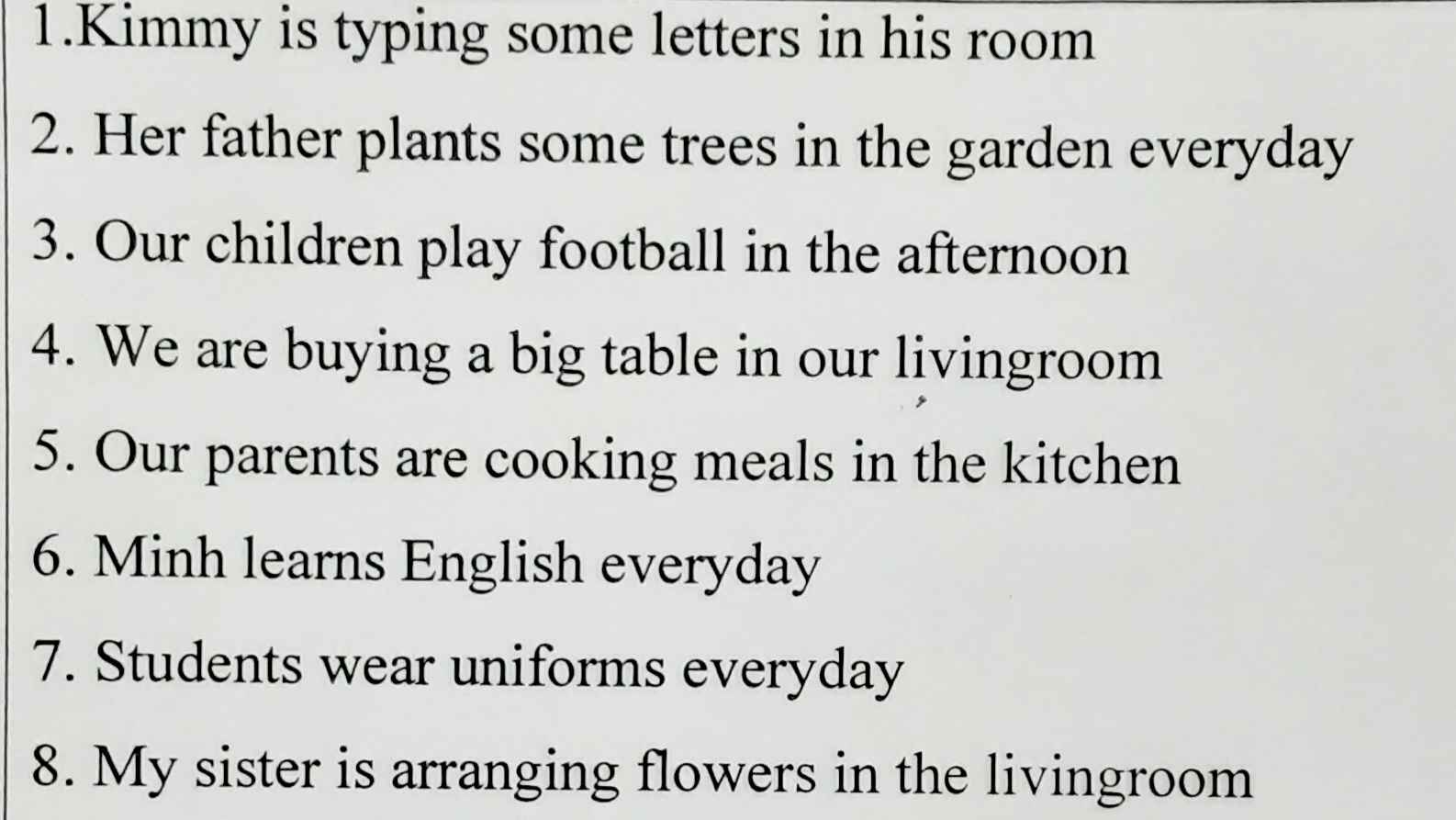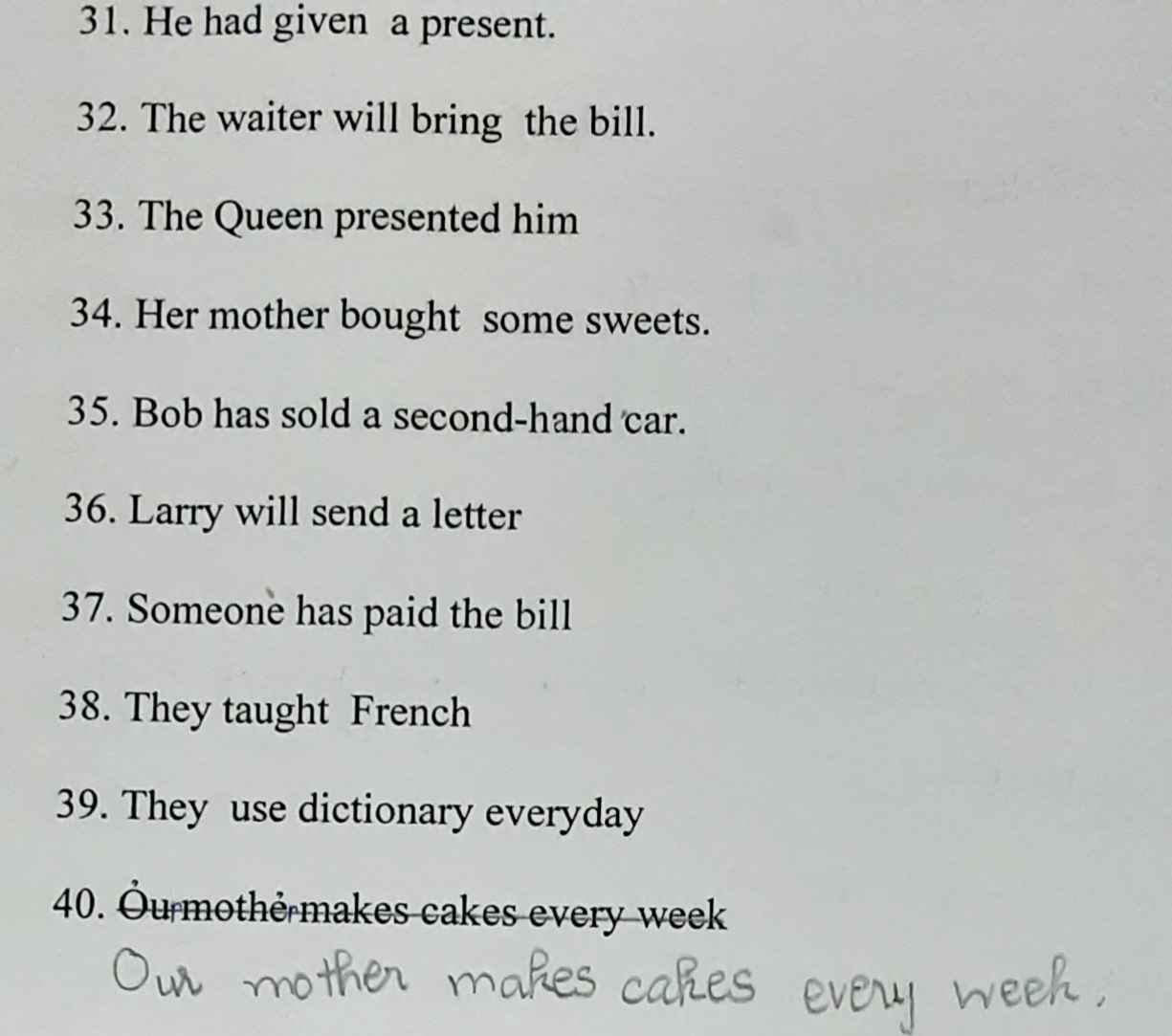
Hãy nhập câu hỏi của bạn vào đây, nếu là tài khoản VIP, bạn sẽ được ưu tiên trả lời.


Tense | Active | Passive |
Simple Present | S + V + O | S+be +P2 + by + O |
Present Continuous | S + am/is/are + V-ing + O | S+ am/is/are + being+ P2 + by + O |
Present Perfect | S + has/have + P2 + O | S + has/have + been + P2 + by + O |
Simple Past | S + V-ed + O | S + was/were + P2 + by + O |
Past Continuous | S + was/were + V-ing + O | S+ was/were + being+ P2 + by + O |
Past Perfect | S+ had + P2+O | S + had + been + P2 + by + O |
Simple Future | S + will/shall + V + O | S + will + be + P2 + by + O |
Future Perfect | S + will/shall + have + P2 + O | S + will + have + been + P2 + by + O |
Be + going to | S + am/is/are + going to + V + O | S + am/is/are + going to + be + P2 + by + O |
Model Verbs | S + model verb + V + O S + modal Verb + have +P2 | S + model verb + be + P2 + by + O S + modal Verb + have been +P2 |

Câu bị động được dùng khi ta muốn nhấn mạnh vào hành động trong câu, tác nhân gây ra hành động dù là ai hay vật gì cũng không quá quan trọng.
Ví dụ: My bike was stolen. (Xe đạp của tôi bị đánh cắp.)
Trong ví dụ trên, người nói muốn truyền đạt rằng chiếc xe đạp của anh ta bị đánh cắp. Ai gây ra hành động “đánh cắp” có thể chưa được biết đến. Câu bị động được dùng khi ta muốn tỏ ra lịch sự hơn trong một số tình huống. Ví dụ: A mistake was made. Câu này nhấn mạnh vào trạng thái rằng có 1 lỗi hoặc có sự nhầm lẫn ở đây, chứ không quan trọng là ai gây ra lỗi này.
They are building a shopping centre.
=> A shopping centre are being built by them
That girl buys a doll
=> A doll is bought by that girl
Mr Hùng teaches English
=> English is taught by Mr Hùng.

1 Some letter are being typed by Kimmy in his room
2 Some trees are planted in the garden by her father everyday
3 Football is played by our children in the afternoon
4 A big table is being bought in our living room
5 Meals are being cooked by our parents in the kitchen
6 English is learnt by Minh everyday
7 Uniforms are worn by student everyday
8 Flowrs are being arranged in the living room by my sister
1.Some letter are being typed by Kimmy in his room.
2.Some trees are planted in the garden by her father everyday.
3.Football is played by our children in the afternoon.
4.A big table is being bought in our living room.
5.Meals are being cooked by our parents in the kitchen.
6.English is learnt by Minh everyday.
7.Uniforms are worn by student everyday.
8.Flowrs are being arranged in the living room by my sister.

1 A present had been given by him
2 The bill will be brought by the waiter
3 He was presented by the Queen
4 Some Sweets were bought by her mother
5 A second-hand car has been sold by Bob
6 A letter will be sent by Larry
7 The bill has been paid
8 French was taught
9 Dictionary is used everyday
10 Cakes are made by our mother every week

Thể bị động của tiếng Anh thì phụ thuộc vào dạng (form) hay thì (tense) của động từ đó, ví dụ:
- Dạng V-ing của động từ: writing → being written
- Dạng To Infinitive của động từ: to write → to be written
- Thì hiện tại hoàn thành: have written → have been written
- Thì quá khứ tiếp diễn: was writing → was being written
1. She will be writting a letter.
\(\Rightarrow\)A letter will be being written by her.
2. I will be doing my homework then.
\(\Rightarrow\)My homework will be being done then by me.
3. My family will be visiting my grandparents next weekend.
\(\Rightarrow\)My grandparents will be being visited next weekend by my family.
4. They will be eating dinner at 7 o'clock.
\(\Rightarrow\)Dinner will be being eaten at 7 o'clock by them.
5. We will be going to stay at Melon hotel.
\(\Rightarrow\)Melon hotel will be being gone to stay at by us.

II.3 nguyên tắc cần nhớ khi chuyển từ câu trực tiếp sang gián tiếp:
Đổi ngôi, đổi tân ngữ
Lùi thì
Đổi cụm từ chỉ thời gian, nơi chốn
Cụ thể như sau:
Rule (Quy tắc) | Direct speech (Trực tiếp) | Reported speech(Gián tiếp) |
1. Tenses (Thì) | Present simple (V/Vs/es) | Past simple (Ved) |
Present progressive (is/am/are+Ving) | Past progressive (was/were+Ving) | |
Present perfect (have/has+VpII) | Past perfect (had+VPII) | |
Past simple (Ved) | Past perfect (had +VpII) | |
Past progressive (was/were +Ving) | Past progressive/ | |
Past perfect | Past perfect | |
Future simple (will +V) | Future in the past (would +V) | |
Near future (is/am/are +going to+V) | Was/were +going to +V | |
2. Modal verbs | Can | Could |
3. Adverb of place | This | That |
These | Those | |
Here | There | |
4. Adverb of time | Now | Then |
Today | That day | |
Yesterday | The day before/ the previous day | |
The day before yesterday | Two days before | |
Tomorrow | The day after/the next (following) day | |
The day after tomorrow | Two days after/ in two days’ time | |
Ago | Before | |
This week | That week | |
Last week | The week before/ the previous week | |
Last night | The night before | |
Next week | The week after/ the following week | |
5.Subject/Object | I / me | She, he /Her, him |
We /our | They/ them | |
You/you | I, we/ me, us |
I. Khái niệm:
Lời nói trực tiếp (direct speech) là sự lặp lại chính xác những từ của người nói.
Lời nói gián tiếp (indirect/reported speech) là lời tường thuật lại ý của người nói, đôi khi không cần phải dùng đúng những từ của người nói.


Em muốn công thức chung hay công thức riêng từng cái ????
Riêng từng cái một